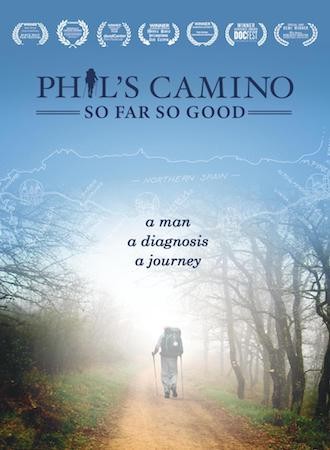
Phil's Camino 2016
Distributed by The Video Project, 145 - 9th St., Suite 102, San Francisco, CA 94103; 800-475-2638
Produced by Annie O'Neil
Directed by Annie O'Neil
Streaming, 24 mins
General Adult
Cancer; Catholicism; Death; Growth and Development
Date Entered: 07/29/2020
Reviewed by Dorothy Ogdon, Emerging Technologies Librarian, University of Alabama at BirminghamPhil’s Camino is a short film that chronicles the experiences of Paul Volker, his family, and friends as they share in the experience of Phil’s cancer diagnosis and come to terms with the possibility of Phil’s death. As the film opens the viewer learns Phil is receiving treatment for stage four cancer, though no further details on Phil’s diagnosis are included in the film. Phil develops an interest in the Camino del Santiago, a Christian pilgrimage route located in Spain. Unable to travel, he constructs a walking route in his own backyard and simulates walking the 500-mile Camino del Santiago over the course of six months. Friends and family share Phil’s walks, providing opportunities for connection as Phil reflects on life and his relationships with others.
While members of Phil’s family, particularly his wife, express doubt about the efficacy of the treatment he is receiving, he is cleared by his physician to travel to Spain to walk the Camino del Santiago in person. The viewer is shown both the highs and lows of this journey; footage of Phil playfully squirting water on his companion is included, along with an incident in which Phil faints during a worship service.
The material in this film is firmly centered on Phil, his family, and friends, and narrative elements are used sparingly, presenting Phil’s experience without an externally imposed viewpoint. While this is admirable, it may be difficult for some viewers to form a broad understanding of the meaning of Phil’s experiences with the Camino del Santiago within the wider context of Phil’s life and the treatment he is receiving. While it is clear from Phil’s own dialogue that that both camino walks provide opportunities for growth and reflection that he values highly, the viewer is never given background information on why the Camino del Santiago is of significance to Phil. Little information on the Camino del Santiago itself is provided from a historical, cultural, or religious context. The film would benefit from additional narrative elements and a slightly more robust structure, as well as additional background information on the Camino del Santiago and the development of Phil’s interest in walking the route.
Though the sparse narrative elements may make elements of the film difficult to parse, Phil’s Camino a creditably realistic view of the lived experience of a cancer patient outside of a health care setting. That perspective will be of interest to audiences hoping to gain an understanding of the experiences of patients and their families particularly as related to shifting priorities and anxieties related to death and dying.
Awards:
Palm Springs International ShortFest, Audience Favorite; Flickers Rhode Island Film Festival, First Prize Humanitarian Award; Tacoma Film Festival, Audience Choice Short; La Costa Film Festival, Best Short Documentary; Middlebury New Filmmakers Festival, Best Short Documentary; SFDocs Film Festival, Audience Award; deadCenter Film Festival, Special Jury Short Film; Black Hills Film Festival, Best Short Documentary; WorldFest Houston Film Festival, Special Jury Award; Julien Dubuque Film Festival, People's Choice Award